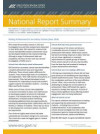This report documents the findings of ERO’s 2013 evaluation of how well 40 secondary schools analysed and responded to their NCEA data.
Methodology
The information for this evaluation was collected from 40 secondary and composite schools as part of each school’s education review during Terms 2 and 3, 2013. These schools represented a variety of deciles and sizes, and were from a range of locations – from main urban centres to small rural settlements (see Appendix 2).
Three broad questions were the focus of this evaluation:
How effectively are schools using inquiry and improvement approaches to increase the number of students leaving school with NCEA Level 2 or above?
What activities, innovations or approaches have schools used to successfully increase the number of students leaving with NCEA Level 2 or above?
What factors/issues or challenges have prevented schools effectively inquiring and improving their number of school leavers with NCEA Level 2 or above?
In the context of this evaluation, ‘inquiry and improvement’ processes include the range of activities schools undertake to analyse and respond to student achievement information. These inquiry processes which schools could use include regular self-review activities, departmental reviews and annual reports, as well as the various teaching as inquiry projects underway at a school. They can also include informal activities based on staff judgements in response to an issue affecting student achievement, engagement or attendance. The responses schools could make can include changes to their curriculum, pastoral care or careers systems.
The main area for investigation was how schools have responded to their annual NCEA results. ERO evaluated how schools analysed their 2011 and 2012 results and what they did to improve student achievement. To be judged as effective, ERO found initiatives had led to increases in student achievement. The data examined by review teams included the Ministry of Education’s roll-based achievement profiles for each school.
While the emphasis was placed on achievement at NCEA Level 2, review teams examined a variety of achievement information to make judgements about how well schools were developing effective inquiry and improvement processes. This included other NCEA achievement information and assessment information from students in Years 7 to 10 (or 9 to 10, where appropriate).

